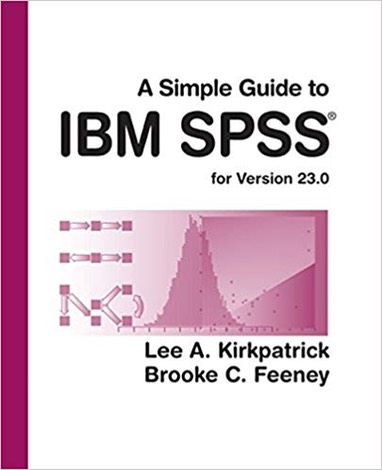There are no required textbooks for this class. The following are recommended.
RECOMMENDED REFERENCE BOOKS:

American Psychological Association (2009). Publication Manual of the American Psychological Association (6th ed.). Washington, D.C.: Author.

Kirkpatrick, L.A. & Feeney, B.C. (2015). A simple guide to IBM SPSS statistics, Version 23.0 (14th ed.). Belmont, CA: Wadsworth.
A NOTE ABOUT THESE BOOKS:
You should seriously consider buying the APA Publication Manual. You’ll also want a book on SPSS to refer to, although if you prefer, you can feel free to use something other than Kirkpatrick. Although these books are optional, they are available at the Huntley bookstore.
ABOUT THIS COURSE (FALL):
As indicated by its name, the purpose of this course is to hone skills you have already developed, namely the skills required to design research studies in psychology. The course has been designed for (and is restricted to) students who were invited last spring to write a senior honors thesis in psychology this year. To that end, the main goal of the course will be to have developed an honors-quality research proposal by the end of the semester, and to have collected and analyzed some preliminary ("pilot") data, so that you'll have a good head start on your honors thesis, which will be completed in the spring semester.
Among the topics we will at least touch upon in the course are:
- Methods and theory of scientific research
- How to conduct a thorough literature review
- How to write a scientific research report
- How to analyze data using SPSS for Windows
- Ethical issues in the conduct of research
Note that at the end of the fall semester, each of you will be required to present your pilot data (in the context of a broader presentation about your project) to the members of the psychology field group (date, time, and location of the oral presentations to be announced later in the semester). Only those students whose data and presentations are of sufficiently high quality—and who achieve a B or better in this course, while also meeting all of the other criteria specified in the Pitzer College course catalog—will be allowed to continue in the honors program.
CONTINUATION OF THE THESIS PROGRAM (SPRING):
Those students allowed to continue in the honors program will enroll in Psychology 191 (Senior Thesis in Psychology) next spring; this course will include a once-a-week meeting designed to support students in their data-gathering and thesis-writing. At the end of the academic year, students will present their completed thesis research in at least 2 academic conferences, as described below.
REQUIRED: Academic Festival, Pitzer College campus, end of spring semester
In addition, students are required to present their research at one of the following:
- OPTION 1: Regional Psychology Undergraduate Research Conference at the University of Redlands, Saturday, April 13, 2019
- OPTION 2: Western Psychological Association (WPA) in Pasadena, April 25-28, 2019 (deadline for submitting proposals to WPA is November 15, 2018)
A rough draft of the thesis will be due 4 weeks before the end of the spring semester (the week of April 8) and the final thesis will be due 2 weeks later (the week of April 22). Final bound copies of the thesis will be due 1 week after that (the week of April 29).
To receive honors in psychology at graduation, a student must have successfully completed a senior thesis—earning either an A or an A- on the thesis—and have met the GPA criteria specified in the Pitzer College course catalog.
WRITING CENTER:
Located in 131 Mead Hall, just across from the fountain, the Pitzer Writing Center offers students free one-on-one conferences with peer Fellows trained to consult on assignments in all disciplines at any stage of the writing process, from brainstorming ideas to polishing a final draft. The Writing Center is one of Pitzer’s most popular academic resources, holding over 1,100 appointments each year. I strongly urge you to make early and frequent use of this resource throughout the writing process. Regular 50-minute appointments are available, as are two-hour appointments for senior thesis writers. The Writing Center also offers workshops on writing as a process and practice throughout the year. Please visit the Writing Center’s website for more information: http://www.pitzer.edu/writing-center.
ACADEMIC ACCOMMODATIONS:
Please note that I will make every reasonable effort to accommodate students with disabilities. To request academic accommodations due to a disability, please contact Associate Dean of Students & Director of Academic Support Services Gabriella Tempestoso. She can be contacted via email at Gabriella_Tempestoso@pitzer.edu or at (909) 607-3553.
STANDARD CONTENT WARNING:
Please note that the material covered in this course may be challenging to some students, because it will cover topics related to human psychology, possibly including subjects such as mental illness, depression, suicide, psychosis, child neglect or maltreatment, pathological behaviors, sexual behaviors, evolution, obesity and/or eating disorders, recreational drug use/abuse, or any of several other topics that some individuals might find re-traumatizing. Please feel free to step outside during a class if you need to. Having said that, please be aware that these are standard topics of discussion in psychology courses, so any of the information covered in the course could appear on exams or quizzes.